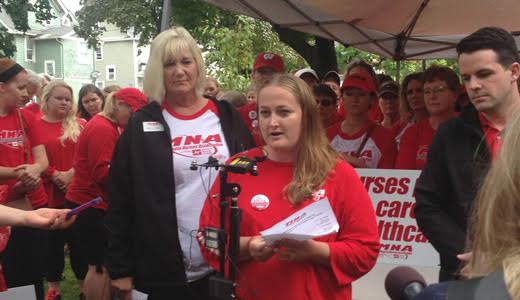
COON RAPIDS, Minn. (PAI and Workday Minnesota) — Morganna Moon and Lou Ann Uhr spent 22 hours in negotiations on Sept. 2 with Allina Health, then joined hundreds of their colleagues Monday on the picket line at Mercy Hospital in Coon Rapids, Minn.
But unlike prior nurses strikes, in Minnesota and elsewhere, these nurses had to walk out – after management did.
“We tried everything in order to not be here” on strike, said Moon. But even after the Minnesota Nurses Association compromised on the key issue of health insurance, Allina still wanted more, she said.
Unlike the nurses’ weeklong strike in June, “This time we have no choice but to walk out with no end date,” she said.
Moon and Uhr were among some 3,800 registered nurses who were forced to strike. Picketing began at 7 am on Labor Day at Mercy, Abbott Northwestern and Phillips Eye Institute in Minneapolis, Unity Hospital in Fridley and United Hospital in St. Paul, and drew 2,500 picketers through the day, despite rain.
The last-minute bargaining session on Sept. 2-3, with the help of a federal mediator, failed to produce a settlement. And with Allina refusing to bargain since then, nurses held a press conference on Sept. 6 urging management to return to negotiations.
Moon and Uhr, co-chairs of the MNA unit at Mercy, were among the nurses who participated in the negotiations. Uhr, a veteran of many contract campaigns, said the recent talks were like nothing she had ever experienced at the bargaining table.
Allina is “not willing to work with us,” Uhr said. Negotiations, she said, are about much more than saving a few dollars on insurance. “It’s about staffing and the care of patients.”
Nurses walking the line at Unity Hospital in Fridley agreed. “It’s about the responsibility of Allina to do good for the community and they’re not doing that,” said Stephanie Carroll. “They’re not living out their values,” added Carla Soler.
Health insurance is the key issue. Allina demands MNA let it terminate the nurses’ health plans and shove the workers into new plans with less coverage and higher deductibles.
The two sides agreed on some smaller issues, such as providing a 24-hour security guard in the emergency rooms to protect nurses and patients, workplace safety, staffing improvements and allowing new nurses into the contract health plans for a limited time.
But they disagreed on health care, even after the union’s executive director, Rose Roach, said “Allina Health has been asking to terminate the nurses’ health plans, and the nurses were willing to allow them to be phased out.” The nurses also proposed a financial safety net for nurses whom health care hikes would hit.
“But Allina must have felt they had a weak victim in the nurses, because they raised the price of an agreement by asking for more concessions. This is what happens when the profit mindset takes over healthcare,” said Roach.
As nurses walked the picket lines, Allina tried to keep facilities running with supervisors and replacement workers. Patients saw the difference. Fedor Obada of Blaine, whose wife just gave birth to twins at Mercy Hospital, said the quality of care was affected. From his wife’s hospital room early on Labor Day morning, Obada saw buses hauling in replacement workers.
“The personnel who just came – they’re kind of lost,” he said. “We can see the difference – and it’s not better than it was before.” Obada came out to the picket line to find out what was going on. After talking with strikers, he returned to his wife’s bedside wearing an MNA cap.
Other unionists, including teachers, paramedics and communications workers, joined the picket lines. Some delivery drivers are stopping at the nurses’ picket line and telling Allina management to come out and drive the delivery vehicles into hospitals.
In their Sept. 6 news conference urging resumption of talks, the union said doing so would “bring experienced nurses back to the bedside.”
But instead of responding to MNA’s last proposal, submitted at 5:15 a.m. on Sept. 3, MNA’s management team walked out 45 minutes later, federal mediators reported.
“Where’s Penny? Dr. Penny Wheeler, you need to respond to the nurses’ proposal, but we know you can’t because you’re not here,” said Angela Becchetti, a registered nurse at Abbott and bargaining team member.
Wheeler is CEO of Allina Health. The union said she and Ben Bache-Wiig, president of Abbott Northwestern, were speaking at a Health Catalyst conference in Salt Lake City. MNA reported Allina has invested more than $100 million in Health Catalyst, a data analytics firm.
Matthew Keller, the union’s regulatory and policy nursing specialist, said the focus of that conference is on “turbo-charging financial outcomes” for health care facilities. That should “not be the goal of nonprofit health care,” he added.
“Nurses are committed,” Becchetti said on Sept. 6. “We’re here to get a fair contract. Allina can end this strike and bring experienced nurses back to the bedside.”
Photo: RN Angela Becchetti, a Minnesota Nurses Assn. bargainer tells reporters the union wants Allina Health Care executives to return to the bargaining table after they walked out rather than responding to MNA’s offer. The walkout forced 5,000 nurses to strike. Looking on is MNA President Mary Turner. Workday Minnesota photo via PAI Photo Service.

MOST POPULAR TODAY

High Court essentially bans demonstrations, freedom of assembly in Deep South

U.S. imperialism’s ‘ironclad’ support for Israel increases fascist danger at home

UN warns that Israel is still blocking humanitarian aid to Gaza

Resource wars rage in eastern Congo, but U.S. capitalism only sees investment opportunity




Comments